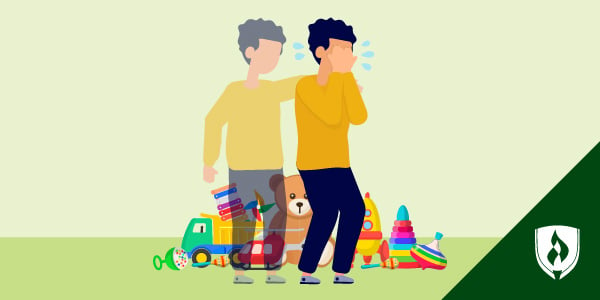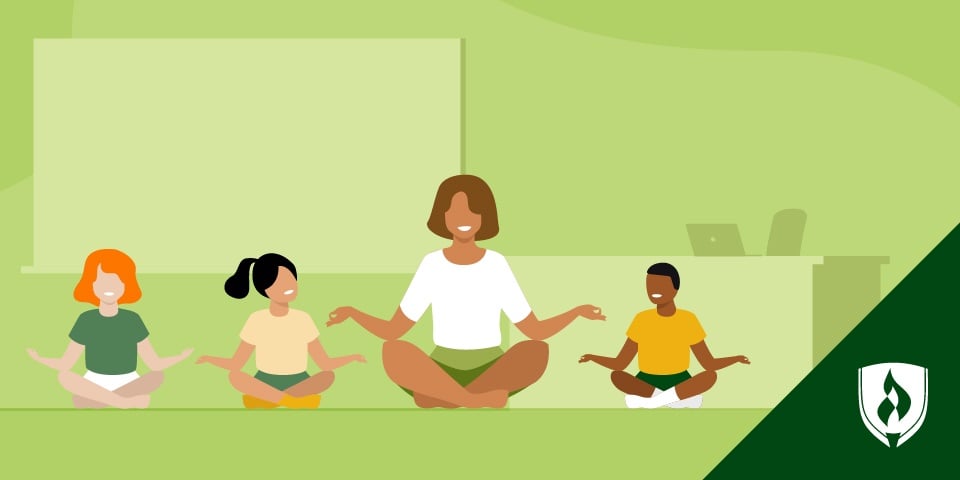Music Therapy Strikes a Chord with Kids: How and Why You Should Take Advantage
By Brianna Flavin on 04/25/2017

It’s another morning, and students are arriving. Some race around the classroom, and some look a little nervous about all the excitement until the teacher gathers everyone for “circle time”. Today, like every day, the teacher leads the students in a welcome song, and everyone claps as they sing the memorized tune.
This scene might sound familiar to anyone who works with younger kids, but did you know it has its roots in music therapy?
The benefits of music therapy enhance child development in ways any parent or teacher will get excited about. Read on to learn more about the concept and hear music therapists share how music therapy elements can benefit your students, and how you can incorporate them in your children’s lives.
But first, what is music therapy?
Music therapy is a term that may seem self-explanatory at first glance. But there’s more to it than you might expect. The American Music Therapy Association (AMTA) defines music therapy as “the clinical and evidence-based use of music interventions to accomplish individualized goals within a therapeutic relationship by a credentialed professional.”
Activities like those done during circle time are effective because they utilize principles of music therapy, according to Andrea Gaitan, a board-certified music therapist with Toneworks Music Therapy.
“Music engages the whole brain,” Gaitan says. “Most school activities tend to rely on specific areas in the brain, but music crosses those borders.”
“The value of music in education has been recognized for centuries,” adds Carmine Visone, owner of Home Away From Home Academy. He believes early interaction with music is important to a young child’s growth and development and can positively affect the quality of their life.
How music therapy benefits children
Now that you have a basic understanding of music therapy in general, you’re probably curious how this concept applies to early childhood development. Keep reading as our experts explain the benefits of music therapy in little ones.
Music aids memorization
Can you recall the theme song from your favorite childhood TV program? What about the lullabies your parents used to sing to you at night? Anyone who’s ever had a song stuck in their head has had a lesson in how hard it is to forget words set to music.
Visone says there’s a reason we learn to sing our ABCs. Toddlers usually aren’t reading fluently, but they have a real knack for memorizing songs. Those simple songs serve as fabulous tools for early literacy training and help the brain recall memorized information long term.
Music education develops fine motor skills
“When I bring an instrument into a classroom, every eye is on me,” Gaitan says.
Instruments can be beautiful and strange-looking, so children tend to want to hold and touch them. When this desire is encouraged, kids get the chance to hone their fine motor skills.
Gaitan points out that playing an instrument often requires movement children don’t practice very often in their daily routines. Visone adds that playing an instrument does wonders for hand-eye coordination.
Music education develops language and reasoning centers
“Early music education will develop the areas of the brain related to language and reasoning,” Visone says. He goes on to explain that the left side of the brain is better developed with music, and songs can help imprint information on young minds.
Language center stimulation in a toddler’s actively growing brain gets an extra boost of attention and breadth when music is involved.
Music therapy helps children cope and feel calm
Music therapy is exactly that—a therapy. And in early childhood education, when students are sometimes too young to explain their feelings or desires, it’s smart to cover as many bases as you can.
“You never know the whole story of children in a preschool class or daycare,” Gaitan explains. “There may be undiagnosed behavioral or anxiety issues. Music can get past those barriers. It involves and unifies everyone.”
Music therapy has had excellent results in developing speech, motor, social and cognitive functions in children with cerebral palsy, autism spectrum disorder and anxiety disorders. But that’s only the beginning.
Familiarity with music boosts confidence
Learning to play a piece of music or sing all the words to a song correctly will challenge a child. Once they have mastered that challenge, the child will typically feel proud of their achievement.
Children learning music can also be more emotionally developed and capable of empathy towards others. They also tend to be better at handling anxiety and have higher self-esteem.
Children who learn to play an instrument will have to set time aside to practice. Rising to the challenge of mastering that instrument can be a valuable lesson in discipline.
Music education helps kids get excited about learning
Music is one of the greater pleasures in life for many people, and there’s a reason for that. Little lights go on all across different regions of the brain when we listen to music—even music we don’t like. Learning music, additionally, is credited as an extremely beneficial practice for lifelong brain health.
Basically, our brains appreciate music. “Introducing music in the early childhood years can help develop a positive attitude toward learning and curiosity,” Visone says. “Music is enjoyable as well as educational, and it keeps children interested and engaged in school.”
Music therapy activities you can use
This all sounds pretty great, right? So what can the average educator, parent or childcare provider do to introduce some of these music therapy techniques (and their benefits) to kids? Here are a few ideas:
Instrument show and tell
If you play an instrument, do it in front of your kids. Or have a friend or a music therapist bring one in for a special show.
“Recorded music isn’t the same thing,” Gaitan says. “Playing an instrument live is more experiential for the kids. They see where the music comes from and want to hold the instrument. It’s multi-modal learning.”
Dance to music
If you ever play music with your children, there’s probably some dancing going on already. Encourage this activity and structure it into your day.
“I know so many teachers who start every morning with songs to get kids to move their bodies,” Gaitan says. “It gets everyone on the same page if they are all clapping together.”
You could also use music and dancing spontaneously whenever kids need to get focused. Children can get their fidgets out, while mentally zooming in. “Music helps focus the whole class,” Gaitan adds.
Make visual schedules and use songs to support them
“Kids love predictability,” Gaitan says.
Gaitan often works with children who have special learning needs and she emphasizes that a strong, familiar schedule is vital to help kids feel safe. When students have a hard time transitioning from one activity to another, or even transitioning to go home with mom and dad, she recommends making a song to give them the cue.
“We make songs to help them walk through the door or clean up after an activity,” Gaitan shares. “Establishing a routine with music helps the kids remember and feel secure about what’s coming next.”
Make something memorable
“There’s a lot of talking in classrooms,” Gaitan says. “Kids get burned out just listening.” But music is a different story. Music can liven up any lesson.
“We all know you can learn with songs. The recall memory goes way back,” Gaitan says. She recommends translating important information into music. “Putting music to a lesson on manners, or the classroom rules song helps everyone remember and engage.”
Hit the right note
The benefits of music therapy are so exciting. You might even be tempted to take up an instrument yourself. Kids naturally burst into song and pick up on melodies, and when you encourage these tendencies, you make yourself an ally with their natural growth.
But music isn’t the only natural growth you should try to encourage. Did you know dramatic play has research-proven cognitive benefits as well? Learn more about how it helps children’s development in our article, “5 Reasons Dramatic Play Matters for Child Development”.
RELATED ARTICLES:




